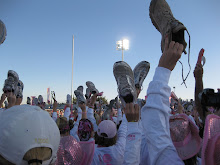It wasn't until I was 30 that I realized I knew people who didn't like their families. People who had siblings with whom they would not speak or parents they despised etc. Somewhere in my 30s I realized my sisters and I are in the minority of families for all generally liking each other and seeking each other out on a regular basis. That's not to say it's always smooth and friendly, but if push comes to shove we are a united force against any outsider every time, even if it's our parents. The crazy thing is we are like that and we weren't abused as children. Go figure.
The Summer We Fell Apart is a novel about the four mostly grown children of two wildly incompetent parents. It's told in sections, one per child (with a final chapter narrated by Mom), and although the time frames of each section occasionally overlap, on the whole they span enough time to cover about a 15 year period in the kids' lives. It's not a great fifteen years for all of them.
The first section is narrated by the baby of the family, Amy. She's about 17 at the time. I find in novels like this one I'm often times so influenced by the first character's view of things it's hard to see the others experience clearly. That is is definitely the case in this story. Not only is Amy first, she's the youngest and least complicated at this point in her life. Her narration seems more objective for its innocence. She sets the stage for a summer where everything changed and then jumps forward to nursing her father on his deathbed. Clearly, her damage has made it impossible for her to abandon him the way he has her.
The second section is all about George, his story gives us a little better look at Amy and a deeper look into the failings of their shared parents. I like him because Amy does and because he seems most normal, except for when he doesn't. George has a host of his own problems his burgeoning affair with the father of one of his best students among them. George reinforces for the reader that no matter how fucked up family and love can be, they are so much better than being alone.
Next we have the older sister Kate, who is the overachieving, successful, disdainful one of the group. Her narration does less to propel the understanding of the family shortcomings than any of the others. Partially because she still idealizes her failed father and partially because her experience if his failure is pretty middle of the road standard Daddy doesn't like my boyfriend kind of stuff. Amy doesn't like Kate much and honestly you can't blame her. The insight into her life does little to make her more sympathetic, but she seems just unlikable rather than damaged or broken.
Finally, we get in a few short pages Finn, the alcoholic middle child who's the most compelling and gets the least space. Finn teeters throughout all the stories on the brink of the abyss (even as a teenager) until he finally drops over the ledge. Another author would have let him die. This one didn't.
In the end the novel, Mom gets to weigh in. There is a final chapter where all the damage comes to stay in the same house to celebrate a joyous occasion and for the first time Mom sees what she might have lost. You can respect her though because she doesn't try to make amends or lament and beg forgiveness, she keeps on with what she's got and hopes for more.
On the whole it's an entirely enjoyable read. The characters slide almost into caricature in a few places: Kate is described as having a look on her face like she smelled something bad, sucked lemons, and injured her eye all within a few short pages. We get it. She's dour. There are a few descriptions that sound a little like a grad school writing course: "He spent the afternoon crashing [from caffeine] like a novice skier on a black diamond trail." Ugh. But, on the whole the novel is compelling and you want to see where these kids end up. If they find something on to which they can hold. Having their primary bond with both parents be so tenuous, especially when those parents are present and just choose not to be available messes with each of the Haas children in different ways, but ways that sometimes give them the tools to understand each other; and sometimes, as with Kate, they don't.
Subscribe to:
Post Comments (Atom)

No comments:
Post a Comment